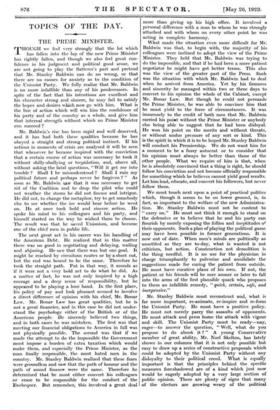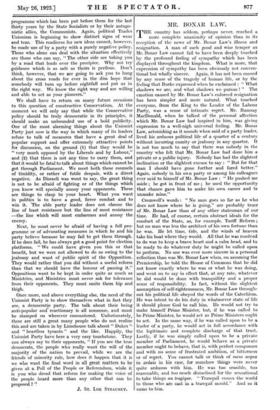TOPICS OF THE DAY.
THE PRIME MINISTER..
Mr. Baldwin's rise has been rapid and well deserved, and it has had both these qualities because he has obeyed a straight and strong political instinct. If his actions in moments of crisis are analysed it will be seen that whenever he became inspired with the conviction that a certain course of action was necessary he took it without shilly-shallying or trepidation, and, above all, without asking the fatal questions, "Will it get me into trouble ? Shall I be misunderstood ? Shall I ruin my political future and perhaps never be forgiven ? " As soon as Mr. Baldwin saw that it was necessary to get rid of the Coalition and to drop the pilot who could not weather the storm he did not finesse and intrigue. He did not, to change the metaphor, try to get somebody else to see whether the ice would bear before he went on. He at once took bold and sincere action. He spoke his mind to his colleagues and his party, and himself started on the way he wished them to choose. The result was that he saved Unionism, and became one of the chief men in public life.
The next great act in his career was his handling of the American Debt. He realized that in this matter there was no good in negotiating and delaying, wailing and abjuring. He saw that there was but one goal. It might be reached by circuitous routes or by a short cut, but the end was bound to be the same. Therefore he took the straight path. Put in that way, it sounds as if it were not a very bold act to do what he did. As a matter of fact, he was not only inspired by a high courage and a deep sense of responsibility, but he appeared to be playing a lone hand. In the first place, his policy of pay and look pleasant seemed to involve a direct difference of opinion with his chief, Mr. Bonar Law. Mr. Bonar Law has great qualities, but he is not a great financier, and in this case he did not under- stand the psychology either of the British or of the American people. He sincerely believed two things, and in both cases he was mistaken. The first was that meeting our financial obligations to America in full was not physically possible. The second was that if we made the attempt to do the impossible the Government must impose a burden of extra taxation which would make them, and especially the Prime Minister, as the man finally responsible, the most hated men in the country. Mr. Stanley Baldwin realized that these. fears were groundless and saw that the path of honour and the path of sound finance- were the same. Therefore he determined that -he must either convert his colleagues or cease to be responsible for the conduct of the Uxchequer. But remember; this involved a great deal more than giving up his high office. It involved a personal difference with a man to whom he was strongly attached and with whom on every other point he was acting in complete harmony.
What made the situation even more difficult for Mr. Baldwin was that, to begin with, the majority of his colleagues were inclined to adopt the view of the Prime Minister. They held that Mr. Baldwin was trying to do the impossible, and that if he had been a more patient negotiator he might have got better terms. This also was the view of the greater part of the Press. Such was the situation with which Mr. Baldwin had to deal when he arrived from America. Yet by his firmness and sincerity he managed within two or three days to convert to his opinion the whole of the Cabinet, except Mr. Bonar Law. But though he could not persuade the Prime Minister, he was able to convince him that he must yield to the force of circumstances. It was immensely to the credit of both men that Mr. Baldwin carried his point without the Prime Minister or anybody else being able to suggest that he had been disloyal. He won his point on the merits and without threats, or without undue pressure of any sort or kind. This is the spirit in which it is to be hoped Mr. Stanley Baldwin will conduct his Premiership. We do not want him for a moment to be a fussy autocrat or to consider that his opinion must always be better than those of the other people. What we require of him is that, when he is absolutely convinced that a thing is right, he should follow his conviction and not become officially responsible for something which he believes cannot yield good results. Let him lead, educate, and convert his followers, but never follow them.
We must touch next upon a point of practical politics which, though it seems to be on lower ground, is, in fact, as important to the welfare of the new Administra- tion. Mr. Stanley Baldwin must not be content to " carry on." He must not think it enough to stand on the defensive or to believe that he and his party can flourish by merely exposing the follies and ineptitudes cc° their opponents. Such a plan of playing the political game may have been possible in former generations. It is now out of date. When men's minds are politically as unsettled as they are to-day, what is wanted is not criticism, but action. Construction not demolition is the thing needful. It is no use for the physician in charge triumphantly to pulverize and annihilate the suggestions made for curing the patient from outside. He must. have curative plans of his own. If not, the patient or his friends will be sure sooner or later to fall into the arms of the first plausible quack who proposes to them an infallible remedy, " quick, certain, safe, and inexpensive."
Mr. Stanley Baldwin must reconstruct and, what is far more important, re-animate, re-inspire and re-form the Unionist Party. He must have a positive policy. He must not merely parry the assaults of opponents. He must attack and press home the attack with vigour and skill. The _Unionist Party must be ready—nay, eager—to answer the question, " Well, what do you propose to do about it ? " A young Conservntive member of great ability, Mr. Noel Skelton, has lately shown in our columns that it is not only possible but easy to draw up a series of constructive proposals which could be adopted by the Unionist Party without any disloyalty to their political creed. What is equally important is that the principles behind the specific measures foreshadowed are of a kind which just now would be eagerly adopted by a very large section of public opinion. There are plenty of signs that many of the electors are crowing weary of the political programme which has been put before them for the last thirty years by the State Socialists or by their antago- nistic allies, the Communists. Again, political Trades Unionism is beginning to show distinct signs of wear and tear. This readiness for new ideas cannot, however, be made use of by a party with a purely negative policy. Those who alone can deal with the situation effectively are those who can say, " The other side are taking you by a road that leads over the precipice. Why not try guidance which is as safe as theirs is perilous. Don't think, however, that we are going to ask you to hang about the cross roads for ever in the dim hope that somebody will turn up before nightfall and put us in the right way. We know the right way and are willing and able to act as your pioneers."
We shall have to return on many future occasions to this question of constructive Conservatism. At the moment we will only say that while the Conservative policy should be truly democratic in its principles, it should make an unbounded use of a bold publicity. One of the most alarming things about the Unionist Party just now is the way in which many of its leaders refuse to talk of measures that have a great deal of popular support and offer extremely attractive points for discussion, on the ground (1) that they would be " very much opposed by the Liberals and by Labour," and (2) that there is not any time to carry them, and that it would be fatal to talk about things which cannot be got through Parliament. We meet both these counsels of timidity, or rather of futile despair, with a direct negative. As Disraeli was wont to say, the great thing is not to be afraid of fighting or of the things which you know will specially annoy your opponents. These are things to clasp to your heart. What you want in politics is to have a good, fierce combat and to win it. The able party leader does not choose the line of least resistance but the line of most resistance —the line which will most embarrass and annoy the enemy.
Next, he must never be afraid of having a full pro- gramme 'or of advocating measures in which he and his party believe because he may fail to get them through. If he does fail, he has always got a good point for election platforms. " We could have given you this or that benefit, but we were not allowed to do so owing to the jealousy and want of public spirit of the Opposition. They would rather that you did without a useful reform than that we should have the honour of passing it." Oppositions want to be kept in order quite as much as Ministries, and Ministries must never ask for tolerance from their opponents. They must smite them hip and thigh.
Once more, and above everything else, the need of the Unionist Party is to show themselves what in fact they are, a democratic party. The talk about their being anti-popular and reactionary is all nonsense, and must be stamped on wherever encountered. Unfortunately, there are still a great many people who do not realize this and are taken in by Limehouse talk about " Dukes " and " heartless tyrants " and the like. Happily, the Unionist Party have here a very easy touchstone. They can always say to their opponents, " If you are the true democrats, the people who really want the will of the majority of the nation to prevail, while we are the friends of minority rule, how does it happen that it is we who want the final word in all great matters to be given at a Poll of the People or Referendum, while it is you who dread that reform for making the voice of the people heard more than any other that can be proposed ? '!
J. ST. LOE STRACHEY.











































 Previous page
Previous page